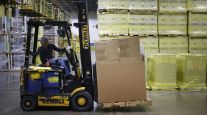Trailer Production in March More Than Doubles From 2010
This story appears in the May 9 print edition of Transport Topics.
Both orders and factory production of new commercial trailers more than doubled in March, compared with the same month of 2010 and leading to escalating prices and longer wait times, industry officials have said.
“This turnaround seems too good to be true,” Jim Maiorana, executive vice president of MAC Trailer Manufacturing Co., Alliance, Ohio, told Transport Topics. “But in our business, it gets turned on fast, but it shuts off fast, though I think we still have a few years to go.”
Manufacturers built 18,313 trailers in March, compared with 8,918 in March of 2010, ACT Research Co., Columbus, Ind., said April 28.
They received orders for 28,075 new trailers in March, compared with 13,496 for the same month last year, ACT reported.
Both categories were up sharply, even against high February figures of 14,525 builds and 22,659 orders, ACT said.
“We don’t have any slots left through the middle of 2012 for the trailers we make for the natural gas market,” Maiorana explained. “For our other trailers, we have orders through the middle of the fourth quarter of this year.”
MAC Trailers builds flatbeds, drop-deck, pneumatic tank and dump trailers.
MAC has hired 300 new workers this year to meet demand and has raised its trailer prices three times over its initial 2011 prices, mainly because of rising commodity prices, Maiorana said.
“Yes, we’ve had multiple increases in price this year, with the rising costs of commodities as the root cause,” Glenn Harney, chief sales officer of Hyundai Translead, San Diego, told TT.
“The cost of manufacturing trailers has been substantial and ongoing for all companies this year because of the increase in raw materials, which make up so many trailer components,” Harney added. “All manufacturers have been raising prices.”
Harney said Hyundai built 180% more trailers this March than a year earlier, and “April was even more dramatic, more than 300% better — kind of off the charts — though both figures were again from two of our worst months in March and April last year.”
Harney, like most trailer manufacturers, declined to release actual numbers.
The growing trailer market is “really a broad-based demand across a wide swath of trailer types,” Kenny Vieth, ACT’s senior analyst, told TT.
“The main force is dry vans, which is the only single type that can really drive the market, since it historically makes up about 60% of production,” Vieth said. “But reefers have also been on an upward swing for the past six months, though they dropped a bit in March.”
Vieth said that ACT’s data also have shown “healthier orders for construction-related equipment, while demand has gone crazy for bulk carriers for the oil and natural gas markets.”
Robert Wahlin, president of Stoughton Trailers LLC, Stoughton, Wis., was just as optimistic about the market as other producers.
“We’re consistent as far as growth and trends with ACT, and we’re ramping up and adding staff as quickly as we can effectively train them and get them on board,” Wahlin told TT.
Stoughton spokesman Keith Wise said the company even has been able to wrest some intermodal chassis business away from China.
“We lost that business to China, and we’ve taken it back, and that’s thrilling,” Wise told TT. “We used to be the top intermodal producer in the United States.”
Wise said that Stoughton was reopening its Evansville, Ind., factory, which had produced chassis, and it would employ 300 people.
“Quality is the reason,” he added, saying the lower-priced products that forced Stoughton out “did not live up to expectations of customers.”
“We had given up all hope of ever seeing that [chassis field] open again,” he said.
Wise declined to say whether Stoughton has raised prices but said a backlog has grown.
“From a dealer’s perspective,” Del Keffer, president of North American Trailer LLC, told TT, “we definitely are seeing a groundswell in orders, but sometimes, delivering them with the maximum profitability for a dealer depends on whether the manufacturer can produce them in timely faction.”
North American, based in Salt Lake City, is a dealer for five different trailer brands.
“Backlogs appear to be increasing monthly between trailer orders and deliveries, based solely on the ability of manufacturers to produce enough of them in a timely fashion,” Keffer added.
He said that “all of our manufacturers have raised prices in some fashion this year for 2011.”
Keffer said that “the increases haven’t been out of line, and no one has canceled orders because of the increases.”
Wabash National Corp., a major trailer manufacturer, reported first-quarter profits on May 3 of $3.2 million, compared with a loss of $139.1 million in the same quarter of last year.
Two other manufacturers, Utility Trailer Manufacturing Co. and Great Dane Trailers, did not return calls requesting comment.


